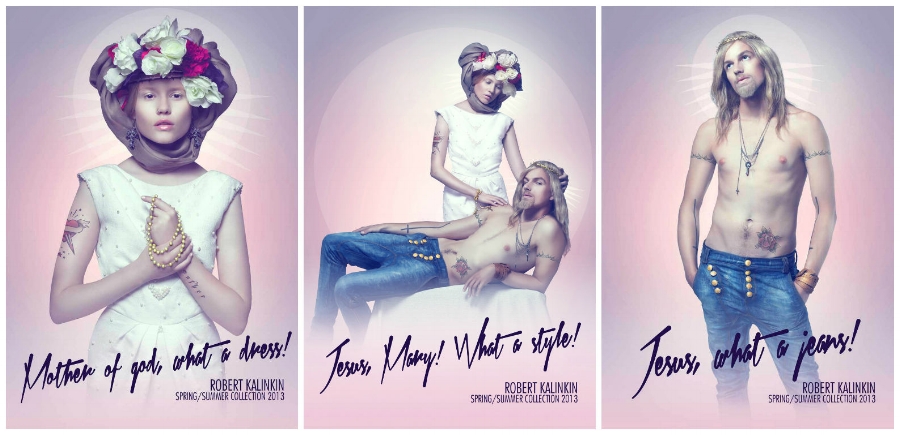
image: Robert Kalinkin
“Jesus, that’s offensive!” took a very literal turn in 2012 when Robert Kalinkin released his Spring/Summer 2013 ad campaign. The Lithuanian fashion designer, who describes his eponymous label as a “fierce-luxe ready-to-wear line,” opted to use models posing as Jesus and the Virgin Mary (albeit tattoo-bearing Jesus and Mary), to sell his seasonal garments. The tagline on one of the ad campaign images read, “Jesus, what trousers!” Another declared in bold, “Dear Mary, what a dress!” Still yet, “Jesus, Mary, what are you wearing,?” posited another.
After receiving complaints about the “inappropriate” and “offensive” images from consumers, Lithuania’s State Consumer Protection Agency (“SCPA”) “consulted with the bishops of the Catholic church, to which nearly 80 percent of Lithuanians adhere,” according to the Economist, and held that the ads were “clearly contrary to public morals” and violated the provisions of the nation’s Law on Advertising. The government body decided that the campaign ran afoul of the law, as it “promoted a lifestyle which is incompatible with the principles of a religious person.”
As a result, the SCPA fined Sekmadienis, the company responsible for marketing and selling Kalinkin’s designs, nearly $1,000.
Sekmadienis appealed the SCPA’s ruling. Landing in front of the European Court of Human Rights (“ECHR”), Kalinkin’s attorney, Karolis Liutkevičius, argued that the SCPA’s “judgment constituted an unreasonable restriction on artists’ and businesses’ freedom of expression.” She reminded the court that Lithuania is a secular state, and that the nation’s official neutrality in matters of religion is “one of the fundamental social principles enshrined in the Constitution.”
In a decision released this week, the ECHR – the court tasked with hearing cases centering on the alleged breaches of the human rights provisions of European Convention on Human Rights by any of the 47 Council of Europe member states – sided with Kalinkin and Sekmadienis. In finding that the company’s freedom of expression had been violated, the ECHR held that while companies have a duty not to be “gratuitously offensive or profane,” at the same time, they have the right to express ideas that might “offend, shock or disturb.”
As noted by the Economist, the case is sure to be one that “law-and-religion pundits will be pondering for years to come,” particularly in light of the SCPA’s ruling, which was “peculiar for a government agency in a secular democracy.” To an American legal mindset, the Economist states, “This could smack of an unwholesome blurring of the lines between church and state authority.”
Speaking of Americans, the timing of the case is an interesting one, as the fashion industry prepares for the annual Metropolitan Museum of Art Costume Institute exhibition and gala, which is slated to stake place in May 2018. This year’s exhibition, which is entitled, “Heavenly Bodies: Fashion and the Catholic Imagination,” will consist of “50 or so ecclesiastical garments and accessories on loan from the Vatican,” displayed with “150 designer garments that have been inspired by Catholic iconography or style,” ranging from Valentino couture gowns to what will certainly be short-and-tight Versace frocks.
It will certainly prove interesting for many, and likely, controversial for others.











